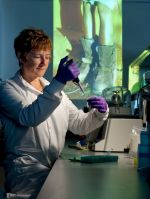Shoes could wipe out tropical disease affecting millions
Wearing shoes could eradicate “in our lifetime” a tropical disease affecting an estimated 4 million people worldwide, according to a medic in the Brighton and Sussex Medical School (BSMS).
 Dr Gail Davey from BSMS is leading a new global initiative to combat foot disease podoconiosis
Dr Gail Davey from BSMS is leading a new global initiative to combat foot disease podoconiosis
 Professor Melanie Newport is using her expertise to unravel the genetic basis of podoconiosis
Professor Melanie Newport is using her expertise to unravel the genetic basis of podoconiosis
Dr Gail Davey has launched a new global initiative, called Footwork, to help combat podoconiosis – a preventable and treatable, yet neglected, tropical disease affecting the foot.
Podoconiosis is a non-infectious form of elephantiasis – so called because the affected foot and leg swells to a huge size - found in highland tropical areas where shoes are frequently not worn and barefoot farmers cultivate in volcanic clay soil, allowing irritant mineral particles to cause damage to the lymphatic system in the legs.
It causes disfigurement, debilitation and ostracism and hinders livelihoods, quality of life and development in at least 10 tropical countries.
The level of income in these areas puts footwear out of reach of many.
Dr Davey, a medical epidemiologist who has worked on podoconiosis since 2002, says that her vision as Executive Director of Footwork is for a world free of podoconiosis in our lifetime. She says: “Footwork will help bring a spotlight to this long-overlooked disease. Podoconiosis is readily preventable by wearing shoes and treatable through a relatively simple but critical regimen of foot-washing, off-the-shelf ointment or emollients, use of compression bandages and skilfully-applied lower-leg massage to aid lymphatic drainage.”
The global initiative aims to achieve the eradication of ‘podo’, as it is commonly known, by raising awareness, new research and data collection, and championing shoes as a public health intervention.
Dr Davey has forged links with more than 15 public and private partners, including footwear company TOMS. The company distributes shoes to children in many low-income countries, some as prevention for podo, others for purposes of broader public health and esteem. The model they try to use is to purchase and distribute shoes made in-country, thus increasing employment as well as providing shoes.
Dr Lorenzo Savioli, Director of the World Health Organization (WHO) Department for Control of Neglected Tropical Diseases, says: "WHO fully supports this laudable initiative. Podoconiosis is a neglected condition that mainly affects marginalised populations. We strongly encourage projects aimed at raising awareness about this disease."
But the work could have health implications beyond eradicating podoconiosis.
Dr Davey’s colleague at BSMS, Melanie Newport, Professor in Infectious Diseases and Global Health, is applying her knowledge to unravel the genetic basis of podoconiosis in Ethiopia - research that could also contribute to tackling tuberculosis, HIV and malaria globally.
Dr Davey adds: “Wearing shoes not only helps prevent podoconiosis, but also a wide variety of foot-related afflictions such as wounds, parasitic worms, tetanus and snakebite. Footwork will help enable shoes to be thought of as ‘the next bed nets’.”
Dr Davey’s work as a world-leading researcher of podoconiosis was profiled in the Lancet on 17 March. More information about BSMS’s contribution to podoconiosis research in infectious disease control, genetics and ethics can be seen in a short film at the BSMS research homepage.
A new website has been launched in conjunction with the initiative (www.podo.org), which will serve as a central source of information on the disease as well as treatment, research, and an online community for those actively working with podoconiosis in the field.
